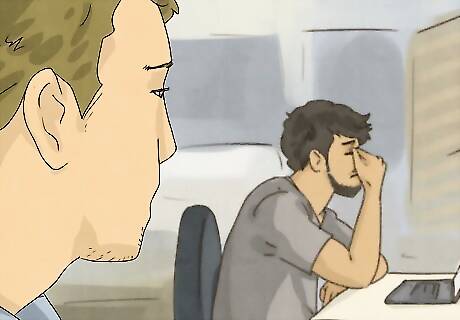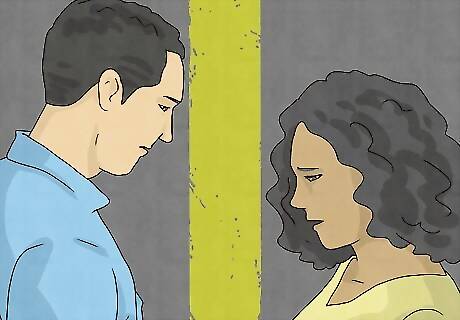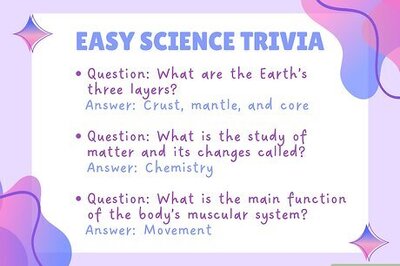
views
Accept what happened so you can move forward.

Accepting trauma doesn’t mean excusing it or forgetting it. Clinical Psychologist Asa Don Brown advises making sure you recognize that something traumatizing happened to you and that you are still feeling a range of emotions about it. Acceptance allows you to make peace with what happened, which can help you forgive the person for your own benefit. Try not to explain it away, and don’t make excuses for the person who traumatized you. It might help to say it out loud, like, “I’ve been traumatized by this person, and I need to work through that.” Professional Counselor Rachel Eddins emphasizes how important it is to “acknowledge your emotions and what you are feeling. Don’t be afraid to feel your emotional pain, like hurt, sadness, and even anger. Identifying your feelings helps you regulate them, and prevents you from pushing them down in an unhealthy way.”
Give yourself time to process everything.

You probably won’t be able to forgive someone right away. It takes time to grieve and process everything after experiencing a trauma, according to Brown. There’s no set timeline for how long it might take to work through your feelings. Go as slowly or as quickly as you’d like to. Eddins explains that it’s important to “soothe your hurt feelings and give yourself compassion for what you’re going through.” It's normal to feel sad, angry, and confused after a traumatic incident. You don’t need to get rid of these feelings altogether before you’re ready to forgive someone. Forgiveness is a decision, not an emotion, according to clinical psychologist Evan Parks. Parks advises thinking about what forgiveness means to you so you'll know what you're working toward. For instance, you may give up the idea that they need to pay for what they've done so you can stop ruminating on it.
Write your feelings in a letter or journal.

Putting your emotions into words can help you navigate them. Brown recommends that you sit down and write about what you used to feel, how you feel now, and what you think forgiveness will give you. Keep the letter private and don’t show it to anyone else. Forgiveness can be really cathartic, and it can help you let go of feelings like sadness and anger.
Talk it through with a friend.

A third-party opinion can help you work out how to forgive someone. If you have anyone close enough that you trust with this info, have a conversation with them about what happened and why you’re trying to forgive the person now. They may be able to give you advice, but they can also just be a listening ear. If you don’t want to talk with a friend about it, consider opening up to a mental health professional.
Empathize with the person, if possible.

Try to see things from their perspective. If you were in their position, would you have done something similar? Even if you can’t put yourself in their shoes entirely, seeing it from their point of view can make it easier to forgive them. You might gain a little insight into why they did what they did, which could help you understand them. For instance, maybe the person who hurt you was under extreme stress at the time. Or, maybe they didn’t know how to express themselves so they took their emotions out on you. This doesn’t excuse what they did, nor does it mean that you think it was right. Understanding their perspective can simply help you move forward and let go of the pain they caused you, according to Brown. Eddins agrees that it’s important to “extend empathy and compassion” to the person who hurt you. “Practicing compassion acknowledges your humanity—it doesn’t mean you agree with their hurtful behavior.”
Be patient with yourself.

Forgiveness isn’t going to happen instantly. Try to remember that forgiveness is a multi-step process that could take a long time. Even when you decide to forgive someone, you might still have some work to do to get there. Try to be kind to yourself throughout the entire process, and don’t hold yourself to any unrealistic standards.
Let go of any expectations you might have.

Offering forgiveness doesn’t necessarily mean the person will change. When you choose to forgive someone, you should do it for yourself. Forgiveness might help improve your relationship or offer the other person some relief, but it’s not guaranteed. Don’t expect the other person to give you an apology or change their behavior, since you could end up disappointed. Forgiving someone can often improve your relationship with others, since working through trauma usually changes you for the better. Eddins encourages people to “let go of the hurt or anger” they may feeling, as it doesn’t “serve them in the long run. Forgiveness sets you free.”
Decide whether or not to tell the person you forgive them.

It may be in your best interest to keep your forgiveness to yourself. If the person who traumatized you hasn’t shown any remorse or even said they’re sorry, they might not react well to you telling them you forgive them. On the other hand, if they’ve apologized to you and you’d like to reconcile your relationship, it might be worth approaching them. If you haven’t contacted the person who traumatized you in a while, there’s no need to do so just to tell them you forgive them. Talking to someone like that can put more stress on you than it’s worth. Parks notes that you don't have to have a relationship with this person just because you forgave them—especially if they haven't changed the behavior that hurt you in the first place. Expert Answer Q Is it good to forgive and forget? Evan Parks, PsyD Evan Parks, PsyD Licensed Clinical Psychologist Dr. Evan Parks is a Licensed Clinical Psychologist and an Adjunct Assistant Professor at The Michigan State University College of Human Medicine. With over 25 years of experience, he specializes in helping people manage chronic pain through the Acceptance and Commitment Therapy (ACT) Approach at Mary Free Bed Rehabilitation Hospital. He also has experience working with others on topics ranging from stress management to mental flexibility. Dr. Parks is also the author of Chronic Pain Rehabilitation: Active Pain Management That Helps You Get Back to the Life You Love. Dr.Parks holds a BA in Theology from Cedarville University, an MA in Counseling Psychology from Western Michigan University, and a PsyD in Clinical Psychology from The Forest Institute of Professional Psychology. Evan Parks, PsyD EXPERT ADVICE Answer from Evan Parks, PsyD: Forgiveness is good, but it doesn't actually mean forgetting what happened and never thinking about the problem again. When we forgive, we are willing to carry with us the pain another person has caused without wishing for them to suffer as we have suffered. Forgiveness is not a one-time act but something we continually do.
Make your boundaries clear.

Clear boundaries can help prevent future incidents with this person. If you’re still in contact with the person who traumatized you, make sure they know that just because you forgave them doesn’t mean they can hurt you again. Set your own boundaries and stand up for yourself if they’re being violated. You might want to limit contact with this person, at least initially. For instance, if you used to see them in person often, stick to phone calls and text messages for now. In cases of severe trauma, you may need to cut contact with them for good. Forgiveness is something you can do on your own without talking to the other person at all. You could also remind the person that you forgave them once, but you might not be able to forgive them again.
Talk to a mental health professional for support.

Forgiveness is hard, and it may not come easy. If you’re wracked with feelings of anger, sadness, or guilt, a therapist can help you work through your emotions in a healthy way. They can also help you figure out the best way to forgive someone who has hurt you in the past without sacrificing your own values or beliefs.




















Comments
0 comment